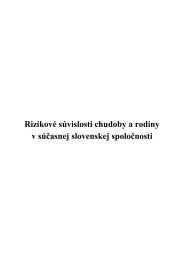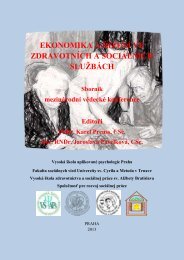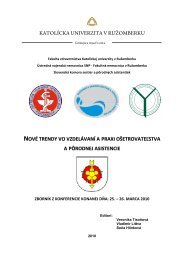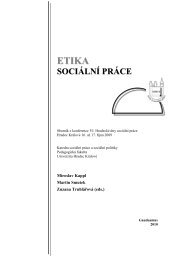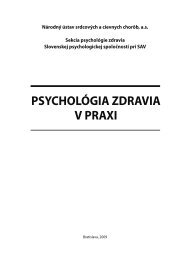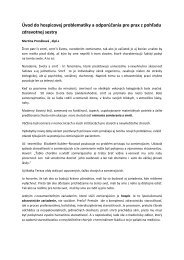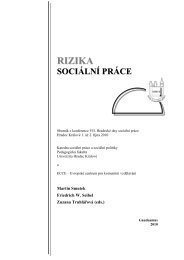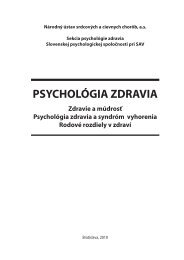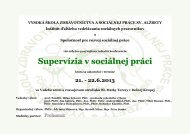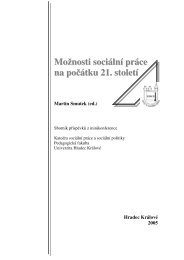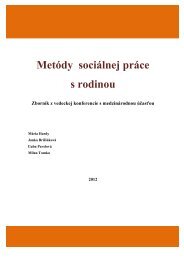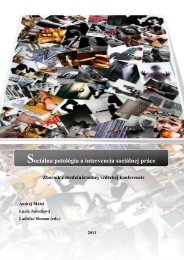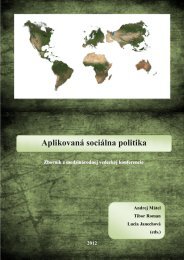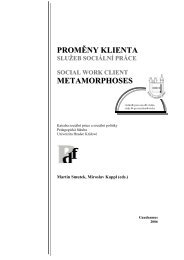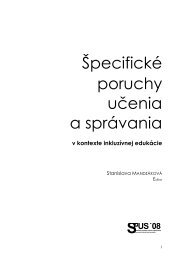Zmena klÃmy â možný dopad (nielen) na obyvateľstvo - Prohuman
Zmena klÃmy â možný dopad (nielen) na obyvateľstvo - Prohuman
Zmena klÃmy â možný dopad (nielen) na obyvateľstvo - Prohuman
Create successful ePaper yourself
Turn your PDF publications into a flip-book with our unique Google optimized e-Paper software.
Research participants were also provided with eight A3 photographs of a young<br />
girl, Cecelia, living in an informal settlement on the outskirts of Nairobi. The photographs<br />
depicted the girl at home with her parents, at pre-school, with friends<br />
and in her community.<br />
Research Phase Three:<br />
Piloting an Early Childhood Global Citizenship Education Programme<br />
The third phase of the research piloted the early childhood global citizenship education<br />
programme developed by the resource development team in response<br />
to the outcomes of phases one and two of the research, and in the context of the<br />
<strong>na</strong>tio<strong>na</strong>l curriculum framework. Close collaboration between the resource development<br />
team and the advisory committee ensured that the complex integration<br />
of learning for global citizenship into diverse curriculum areas reflected good early<br />
childhood educatio<strong>na</strong>l practice, and promoted children’s learning across the<br />
curriculum.<br />
Participant educators in the third phase of the research were given further<br />
materials including: a puppet of the Adika character, additio<strong>na</strong>l stories involving<br />
the Adika and Cecelia characters, and the drafted global justice education programme<br />
as well as the photographs and storybook outlined above.<br />
Twenty-four participant educators were involved in this phase of the research,<br />
half of whom had been involved in phase two of the research, half of whom were<br />
new to the project. All participants were educators in pre-schools or infant classes.<br />
Participants were introduced to the draft education programme, to key issues<br />
in global citizenship education and to the preceding research process. Participants<br />
were asked to record their use of the draft programme with the children<br />
they teach and the children’s learning they perceived. As with phase two, data<br />
were collected through focus groups, participant structured diaries and through<br />
the work of the participating children.<br />
Data A<strong>na</strong>lysis<br />
Data were a<strong>na</strong>lysed using a grounded theory approach (Glaser and Stauss, 1967).<br />
Data sources included interview data, field notes, jour<strong>na</strong>l entries and children’s<br />
work. The data from each phase of the research were reviewed by members<br />
of the resource development team independently. Through close a<strong>na</strong>lysis of the<br />
data, emerging themes were identified for each phase of the research. Through<br />
discussion between team members key emerging themes and a corresponding<br />
coding system were agreed and then applied to the data. This process allowed<br />
issues and evidence of most interest under these themes to emerge.<br />
170



